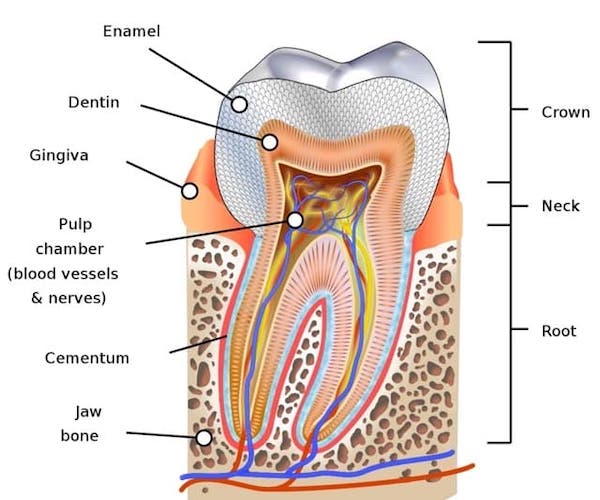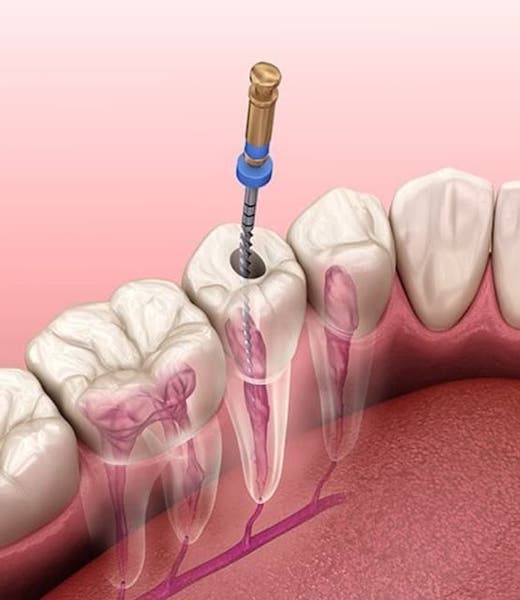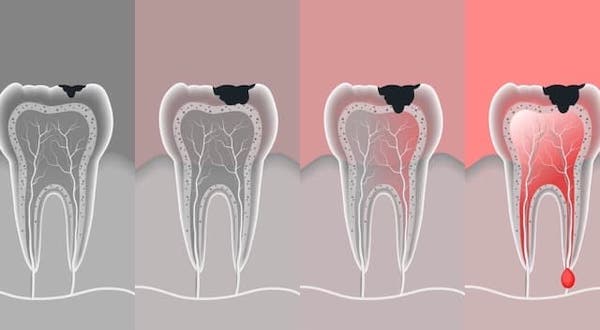Average Cost of A Root Canal Without Insurance: How Much Does A Root Canal Cost in Los Angeles?
Get the Best Price for Root Canals in Los Angeles : Root Canal Cost With & Without Insurance
The Average Cost of a Root Canal Procedure for Different Teeth
When we dive into the costs associated with root canals in Los Angeles, you’ll see that your bill will vary depending on which tooth requires treatment. Front teeth, which dentists refer to as anterior teeth, generally cost less to treat because they’re easier to access and have only one root. You can expect to pay in the ballpark of $600 to $900. Bicuspids, the teeth mid-mouth, run between $700 and $1,000, while molars at the back of your mouth can set you back $1,000 to $1,400 due to their complexity. Don’t forget, these estimates aren’t set in stone; they fluctuate based on the dental practice and its location within Los Angeles.
|
Tooth Type |
Average Cost Range |
|
Front Tooth Root Canal Price |
$720 – $1,250 |
|
Premolar Root Canal Price |
$805 – $1,450 |
|
Molar Root Canal Price |
$970 – $1,872 |
How Much Does a Root Canal Cost With Insurance in Los Angeles?
Navigating the cost of a root canal with dental insurance tends to ease the financial burden quite a bit for us. In Los Angeles, if you’re backed by a decent insurance plan, out-of-pocket costs can drop significantly. On average, you might see figures like $200 to $500 for various types of teeth, with insurance picking up the remainder of the tab. However, it’s crucial to chat with your insurance provider to understand the specifics of your coverage, including deductibles, co-pays, and the percentage of the treatment cost they’ll shoulder.
Apologies for the oversight, let’s delve into what a root canal costs without insurance in Los Angeles. We’re looking at a much heftier sum without the cushion of insurance. A root canal on a front tooth can average around $900 to $1,300, bicuspids can escalate to $1,000 to $1,300, and those pesky molars might hit your pockets for about $1,300 to $1,800 or more. It’s a wide range because various factors like the dentist’s expertise, the severity of the infection, and the location within Los Angeles play a role. Always remember this doesn’t include additional procedures like crowns or follow-up care, which can add to the overall cost.
|
Tooth Type |
Without Insurance |
With Insurance |
|
Front Tooth Root Canal Cost |
$700 – $1,200 |
$200 – $400 |
|
Premolar Root Canal Cost |
$800 – $1,350 |
$300 – $530 |
|
Molar Root Canal Cost |
$950 – $1,500 |
$500 – $955 |
What Influences the Cost of a Root Canal Procedure?
We’ve got several players that influence the price tag on a root canal. First off, where your troubled tooth is located in your mouth can make a big difference. Those molars at the back are like high-maintenance VIPs; they cost more because they’re harder to get to and have more roots to treat.
Next up is the severity of your tooth’s condition. If the poor fella’s severely infected or has complicated canal anatomy, your dentist might need to pull off some advanced dentistry moves, and that’s going to bump up the price.
Also, let’s talk about the professional doing the job—endodontists are the root canal wizards, and they might charge more because of their specialized training. However, your trusty general dentist might have the skills to get it done for less.
Don’t forget, extra procedures aren’t part of the root canal’s base price. If you need a crown (likely after a root canal), or if there’s an abscess that requires eviction, that’s extra.
Lastly, the geographical mood swings of Los Angeles can mean that the cost you find in Beverly Hills might flirt with higher numbers than in other neighborhoods. Clearly, location can be quite the influencer!
|
Factor |
Cost Range |
|
Tooth Location |
|
|
– Front Tooth |
$600 – $1,100 |
|
– Premolar |
$700 – $1,250 |
|
– Molar |
$850 – $1,500 |
|
Severity of Infection |
|
|
– Mild |
$800 – $1,000 |
|
– Severe (with additional procedures) |
$2,000 – $3,000+ |
|
Type of Dentist |
|
|
– General Dentist |
Lower end of ranges |
|
– Endodontist |
Higher end of ranges |
What Is a Root Canal Treatment and Who Needs It?
What is a Root Canal Therapy?
Think of a root canal as your tooth’s knight in shining armor, swooping in to save it from the clutches of decay, fracture, infection, tooth abscess, and toothache. Inside our teeth, beneath the hard enamel and dentin, lies a soft core known as the dental pulp. This pulp palace is full of nerves and blood vessels—really, the lifeblood of the tooth.
When the pulp gets invaded by bacteria, due to a deep cavity or a crack in the tooth, it can start a ruckus—an infection or inflammation that spells trouble and pain. A root canal steps in to evict the troubled pulp, clean out the canals, and seal everything up to prevent further issues.
By removing the infected or inflamed pulp, a root canal stops the pain and saves the tooth from extraction. It’s like a deep clean for your tooth’s canals—think Roto-Rooter for teeth!
Who Needs a Root Canal Therapy?
We might find ourselves needing a root canal if the inner sanctum of our teeth, the pulp, gets infected or inflamed. This can happen due to a variety of reasons, like deep decay from one too many sweet treats, a chips or crack from an enthusiastic round of sports, or even repeated dental procedures that leave the tooth feeling a bit overworked.
So, when should you raise a red flag? Persistent pain that ruins your coffee moments or sends shivers down your spine with cold treats is a sign. Swelling and tenderness around the gums, discoloration of the tooth (no, it’s not trying a new look), or a persistent or recurring pimple on the gums should also ring the alarm bells.
Essentially, if your tooth starts sending SOS signals—pain, sensitivity, or visual cues—it might be time to consult your dentist or endodontist to see if a root canal could be your hero.
What Factors Influence the Cost of Root Canals in Los Angeles in 2025?
Prices Based on Type and Location of the Tooth
Let’s break down how prices sway based on the type and location of the tooth that’s giving us grief. Front teeth, our smiling champions, come with a lower cost for root canals because they only have one root to contend with, making them easier to navigate.
On the flip side, we’ve got our bicuspids and molars, the back-end workers that handle the heavy chewing. Their root canals run at a higher cost because these teeth typically have two or more roots, making the work more complex and time-consuming.
And if you’re curious about how location affects price, Los Angeles is a vast city with different price points. In upscale neighborhoods where the cost of living and dental office overhead is higher, root canal prices might follow suit.
Prices Based on the Difficulty of the Root Canal
Let’s not forget, the degree of difficulty can really tweak the price of a root canal. We’re talking about situations where your tooth’s roots are throwing a bit of a curveball – literally. Curvy, narrow or complicated root structures require more time and precision, so they can nudge the cost upward.
And then there’s the tooth’s history. If you’ve needed multiple procedures on the same tooth, it might be a bit of a battle zone, and treating it delicately and effectively can require more sophisticated tactics (and, you guessed it, more moolah).
Now, one more thing – if that infected tooth decides to wreak havoc without any notice, forcing you into an emergency root canal, the urgency might also push the price higher. After all, we’re paying for quick and specialized problem-solving here.
Insurance and Financing Options for Root Canals
How Insurance Affects Root Canal Costs in Los Angeles
Dental insurance in Los Angeles can really take the edge off the root canal bill. It’s about those policy details, of course – some plans cover a hefty chunk of endodontic treatments, leaving us with just the co-pay or deductible to handle. Percentage of coverage can vary, typically ranging from 50% to 90% of the cost, depending on whether your dentist is in-network and the specifics of your plan.
Before you commit to treatment, have a chat with your insurance provider. There, you can figure out the nitty-gritty of what’s covered, including the number of root canals per year. Mind you, annual maximums can limit how much insurance is going to fork out.
Knowing these details isn’t just responsible; it gives us peace of mind, so we’re not blindsided by unexpected costs and can focus on what’s important — getting that tooth fixed.
Average Root Canal Costs:
- Front Tooth: $620 – $1,100
- Premolar: $705 – $1,250
- Molar: $870 – $1,472
Insurance Coverage:
- Typical coverage: 50% – 80% of the cost after deductible
- Annual maximum benefit: Often around $2,000
Cost Comparison Example:
Without Insurance:
- Full cost of molar root canal: $1,472
With Insurance:
- Insurance covers 50%: $736
- Patient pays: $736
Alternative Financing and Payment Plans To Pay for Cost of Root Canal in Los Angeles
We’re not without options if insurance isn’t picking up the tab. Many dental offices in Los Angeles offer alternative financing and payment plans to help us manage the cost of a root canal without breaking a sweat. Some plans offer 0% interest if paid off within 6-12 months, and for those of us needing more time, longer terms with low interest are also available.
And let’s not forget about the in-house membership programs some dental offices offer. They’re like a secret menu for savings, with fixed discounts on root canals and other treatments, and often include perks like no-cost checkups and cleanings.
One popular option outside of dental offices is CareCreditⓇ, basically a credit card for healthcare costs that can come in handy for unexpected dental work. Financing the cost of a root canal with immediate approval can be a real tooth-saver.
It’s like a choose-your-own-adventure book but for paying dental bills – there’s usually a path that fits our financial situation.
Setting Up a Health Savings Account (HSA and FSA)
Setting up a Health Savings Account (HSA) or Flexible Spending Account (FSA) can be a clever move for us, especially when facing dental procedures like root canals. These accounts are like financial first aid kits for healthcare expenses—they’re there when we need them, and they offer tax advantages to boot!
With an HSA, we contribute pre-tax dollars from our paycheck, which we can later use for eligible healthcare costs, including dental work, without paying taxes on that money. It’s like giving our money a health-focused mission. And the neat thing about HSAs is that the money rolls over each year, so we can build up a reserve for future health expenses.
FSAs are similar siblings with a use-it-or-lose-it policy within the plan year, which means we’ve got to be a bit more tactical about our contributions. They’re perfect for planned procedures, such as a root canal we know is on the horizon.
By smartly using an HSA or FSA to pay for out-of-pocket root canal expenses, we’re effectively getting a discount equal to our tax rate, a benefit we shouldn’t overlook.
When to See a Doctor
When to See a Dentist or Endodontist in Los Angeles?
It’s crucial to listen to our teeth—they usually tell us when it’s time to visit a dentist or endodontist in Los Angeles. If we’re feeling persistent pain that doesn’t seem to have a fan club, sensitivity to heat or cold that lingers like an unwanted guest, or tenderness when we bite or chew, it’s time to make a move.
Also, be on the lookout for color changes (your tooth shouldn’t be going through mood swings), swelling around the tooth, or a persistent gum pimple—these are red flags that it’s not all sunshine and rainbows in our mouth.
While many general dentists are skilled at root canals, endodontists are the special forces of tricky cases, with additional training specifically in this area. If our dentist recommends seeing an endodontist or if it’s a particularly complex case, they’re probably suggesting we tap into that extra expertise. Remember, our goal is to keep our natural choppers as long as possible, and these pros can help us do just that.
Root Canal Alternatives
Tooth Extraction
Tooth extraction is the no-turning-back option, the last resort when a root canal doesn’t cut it or isn’t viable. It’s the process of pulling the tooth out of its cozy little socket because of severe decay, infection, or crowding, or maybe because it’s been damaged beyond repair.
Here’s the lowdown: extractions can cost less upfront compared to root canals, but don’t let that fool us. The kicker comes in when we consider the aftermath—the space left behind needs to be filled with an implant, bridge, or denture to maintain a good bite and keep the other teeth from playing musical chairs.
And while extraction can relieve the pain and prevent the spread of infection, it also means saying goodbye to a natural tooth. So weigh the pros and cons and consider factors such as long-term oral health and costs.
Pulp Capping
Pulp capping is like swooping in early—it’s a dental procedure we use when the tooth’s nerve is exposed, but not quite ready to wave the white flag. It’s a preemptive strike, in a way. Our dentist swooshes in a protective dressing, usually calcium hydroxide or mineral trioxide aggregate (MTA), which encourages the tooth’s nerve to heal from its little trauma.
This is most effective when we’re young since younger teeth are the equivalent of superhero healers. It’s also less invasive and less expensive than a full-blown root canal, and it allows us to keep our natural smile intact.
But, like any good hero story, pulp capping isn’t bulletproof. Success isn’t guaranteed, and if the damage was too much of a villain, we might still have to face a root canal down the line. Pulp capping is a bit like a dental gamble, but when it works out, it works out beautifully.
Dental Implant
Dental implants are the come-back-kid of dental treatments. When a tooth is past the point of saving and extraction is the only option, implants are like a second chance for our smile. They’re titan-strong titanium posts that are placed right into the jawbone, where they buddy up with the bone to create a sturdy foundation for an artificial tooth.
Now, while implants can be the smile-transforming heroes, they’re not exactly the budget-friendly sidekick. They’re generally more expensive than a root canal and extraction combined, and the process is a long-haul flight—it can take several months for the implant to fuse with the bone before the pearly-white crown comes on top.
But hey, the perks? Implants don’t rely on neighboring teeth for support, they look and feel like VIP natural teeth, and they’ve got the longevity to boot. Implants are often worth the investment for those of us looking for a long-term solution that keeps our grin top-notch.
FAQs
Why Should I Save My Natural Tooth?
Saving our natural tooth is like holding onto a piece of ourselves that’s irreplaceable—because, well, it is! Opting for a root canal to rescue a troubled tooth means we get to keep our pearly original with all its nuances, like matching color and shape to our other teeth for that seamless smile.
Our natural teeth have this unique sensation when we bite down, called proprioception, which lets our brain know just how hard we’re chomping. Plus, natural teeth support the jawbone and surrounding teeth, keeping everything in line and preserving the integrity of our facial structure and oral health.
And let’s not underestimate the power of a natural tooth when it comes to chewing efficiency and overall comfort. It’s always more desirable to keep our real teeth than to explore replacements, which, although advanced, can’t quite fully mimic what Mother Nature gave us.
Do I need a Crown after an RCT?
After we conquer a root canal treatment (RCT), whether or not we need a crown depends on the tooth’s location and how much of it has become a dental battleground. If the tooth is a back one, like a molar or premolar, we’ll usually need a crown because these guys bear the brunt of chewing and have become vulnerable post-RCT.
Skipping the crown could be like stepping into a rainstorm without an umbrella—a broken tooth storm is likely. But if our RCT was victorious on a front tooth, we might not need a crown, though it’s best we powwow with our dentist to figure out the right game plan.
The crown acts like armor, reinforcing our tooth and making sure our victory over decay lasts a lifetime, or at least a very long time.
What Happens if You Skip a Root Canal?
If we skip a root canal, we’re essentially leaving our tooth wide open to an onslaught of trouble. The pain that has been our unwelcome dining companion? It’s going to stick around and could get worse since the root of the problem hasn’t been dealt with.
Over time, that infection festering inside our tooth can spread to the jawbone and even other parts of our body. It’s not just about oral health anymore—it becomes a whole-body issue. Without treatment, the tooth will likely wave the white flag, leading to extraction and more complex dental work like implants or bridges.
So really, while root canals might seem like something we want to avoid, they’re important, not just for our smiles but for our overall health. They’re like stepping in before a small campfire becomes a forest blaze.
Is there a less expensive alternative to root canals?
Absolutely, there are less pricey routes on the dental map, with tooth extraction being the most common detour. It might seem wallet-friendly at first, offering an escape route for as low as $99 to $200. But don’t let the initial cost allure fool us; this shortcut can take us down a road of additional dental work like bridges or implants, which can end up costing us more in the long run.
Remember, these alternatives can impact our oral health and the natural harmony of our teeth. Choosing the right path is a balance of cost, long-term health, and well-being. It’s always smart to consult with our dental professional to weigh the benefits against the risks and costs.
MAKE AN APPOINTMENT
RECENT BLOG POSTS
Root Canal Los Angeles
Emergency Dentist Near Me
Holistic Dentist
Tooth Extraction Los Angeles
Dental Implants Los Angeles
All on 4 Dental Implants
Full Mouth Reconstruction
Copyright © 2025 LA Dental Experts




